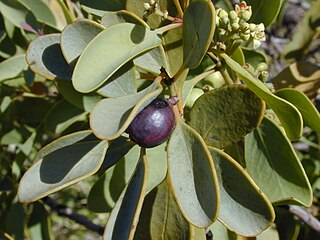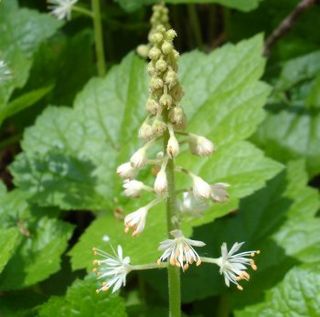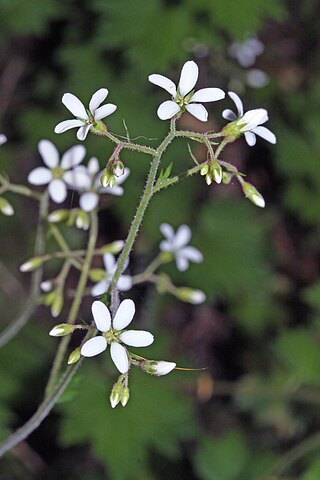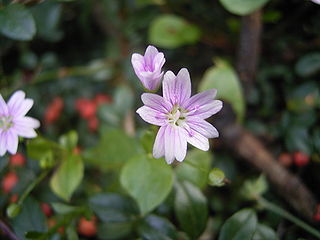
Saxifragales is an order of angiosperms, or flowering plants, containing 15 botanical families and around 100 genera, with nearly 2,500 species. Of the 15 families, many are small, with eight of them being monotypic. The largest family is the Crassulaceae (stonecrops), a diverse group of mostly succulent plants, with about 35 genera. Saxifragales are found worldwide, primarily in temperate to subtropical zones, rarely being encountered growing wild in the tropics; however, many species are now cultivated throughout the world as knowledge of plant husbandry has improved. They can be found in a wide variety of environments, from deserts to fully aquatic habitats, with species adapted to alpine, forested or fully-aquatic habitats. Many are epiphytic or lithophytic, growing on exposed cliff faces, on trees or on rocks, and not requiring a highly organic or nutrient-dense substrate to thrive.

The Santalaceae, sandalwoods, are a widely distributed family of flowering plants which, like other members of Santalales, are partially parasitic on other plants. Its flowers are bisexual or, by abortion, unisexual. Modern treatments of the Santalaceae include the family Viscaceae (mistletoes), previously considered distinct.

Hydrangeaceae is a family of flowering plants in the order Cornales, with a wide distribution in Asia and North America, and locally in southeastern Europe.

Ribes is a genus of about 200 known species of flowering plants, most of them native to the temperate regions of the Northern Hemisphere. The various species are known as currants or gooseberries, and some are cultivated for their edible fruit or as ornamental plants. Ribes is the only genus in the family Grossulariaceae.

Saxifragaceae is a family of herbaceous perennial flowering plants, within the core eudicot order Saxifragales. The taxonomy of the family has been greatly revised and the scope much reduced in the era of molecular phylogenetic analysis. The family is divided into ten clades, with about 640 known species in about 35 accepted genera. About half of these consist of a single species, but about 400 of the species are in the type genus Saxifraga. The family is predominantly distributed in the northern hemisphere, but also in the Andes in South America.

Cercocarpus, commonly known as mountain mahogany, is a small genus of at least nine species of nitrogen-fixing flowering plants in the rose family, Rosaceae. They are native to the western United States and northern Mexico, where they grow in chaparral and semidesert habitats and climates, often at high altitudes. Several are found in the California chaparral and woodlands ecoregion.

Saxifraga is the largest genus in the family Saxifragaceae, containing about 465 species of holarctic perennial plants, known as saxifrages or rockfoils. The Latin word saxifraga means literally "stone-breaker", from Latin saxum + frangere. It is usually thought to indicate a medicinal use for treatment of urinary calculi, rather than breaking rocks apart.

Amorpha is a genus of plants in the pea family, Fabaceae. All the species are native to North America, from southern Canada, most of the United States (US), and northern Mexico. They are commonly known as false indigo. The name Amorpha means "deformed" or "without form" in Greek and was given because flowers of this genus only have one petal, unlike the usual "pea-shaped" flowers of the Faboideae subfamily. Amorpha is missing the wing and keel petals.

Peridiscaceae is a family of flowering plants in the order Saxifragales. Four genera comprise this family: Medusandra, Soyauxia, Peridiscus, and Whittonia., with a total of 12 known species. It has a disjunct distribution, with Peridiscus occurring in Venezuela and northern Brazil, Whittonia in Guyana, Medusandra in Cameroon, and Soyauxia in tropical West Africa. Whittonia is possibly extinct, being known from only one specimen collected below Kaieteur Falls in Guyana. In 2006, archeologists attempted to rediscover it, however, it proved unsuccessful.

Haloragaceae is a eudicot flowering plant family in the order Saxifragales, based on the phylogenetic APG system. In the Cronquist system, it was included in the order Haloragales.

Mitella is a genus of flowering plants known as miterworts or bishop's caps. Mitella species are native to temperate and arctic North America and Asia.

Boykinia is a small genus of plants related to the saxifrages. It contains at least nine species, known as brookfoams. Brookfoams are glandular rhizomatous creeping perennials with highly lobed or toothed leaves and inflorescences of petite flowers. They are native to North America and Asia.

Montiaceae are a family of flowering plants, comprising about 14 genera with about 230 known species, ranging from small herbaceous plants to shrubs. The family has a cosmopolitan distribution.

Micranthes is a genus of flowering plants in the saxifrage family. It was formerly included within the genus Saxifraga until recent DNA evidence showed the members of what is now Micranthes are more closely related to Boykinia and Heuchera than to other members of the genus Saxifraga.

Asimitellaria is a genus of flowering plants in the family Saxifragaceae that is native to Japan and Taiwan. Formerly a section in the genus Mitella, Asimitellaria was elevated to genus rank in 2021.

Ozomelis is a small genus of flowering plants in the family Saxifragaceae, native to Alaska, western Canada and the western United States. It is probably sister to Heuchera.
Brewerimitella is a genus of flowering plants in the saxifrage family, Saxifragaceae. It includes two species of perennials native to western North America, ranging from California and Nevada to Montana, Alberta, and British Columbia.
















